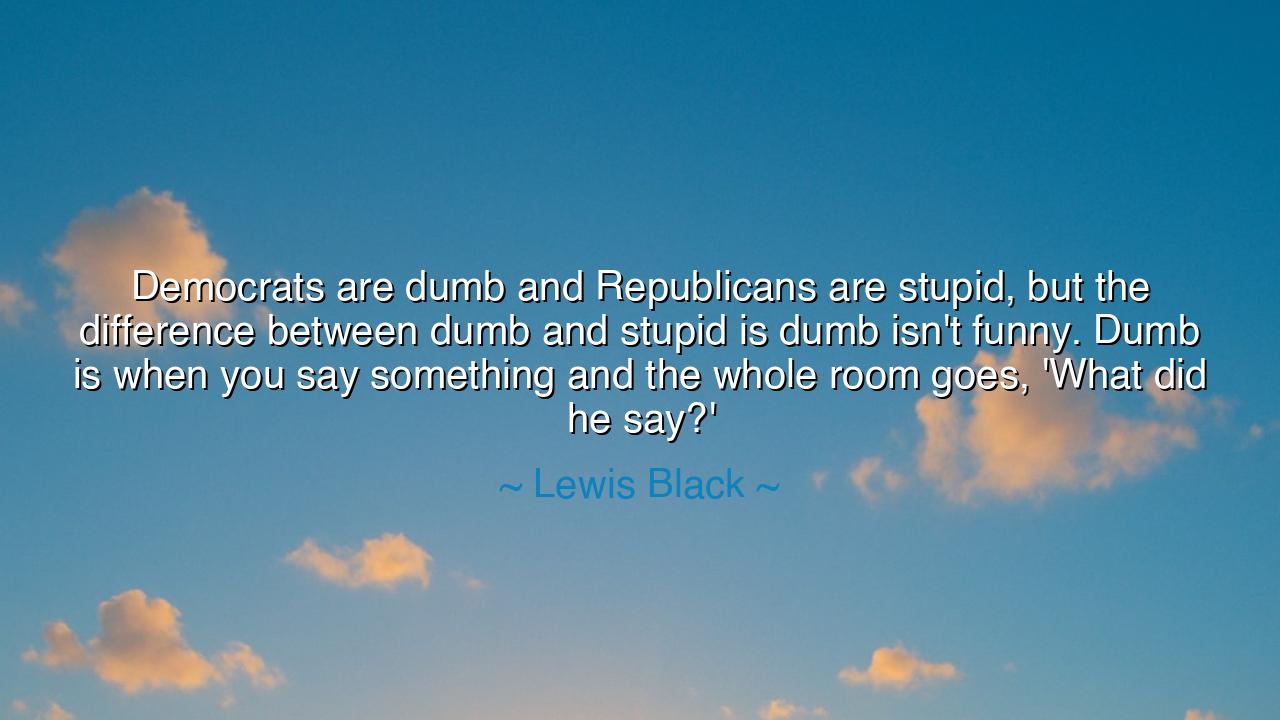
Democrats are dumb and Republicans are stupid, but the difference
Democrats are dumb and Republicans are stupid, but the difference between dumb and stupid is dumb isn't funny. Dumb is when you say something and the whole room goes, 'What did he say?'






The fiery satirist Lewis Black, whose words thunder with both rage and reason, once said: “Democrats are dumb and Republicans are stupid, but the difference between dumb and stupid is dumb isn’t funny. Dumb is when you say something and the whole room goes, ‘What did he say?’” Though spoken with the rough laughter of political comedy, this saying holds within it an ancient truth — a lesson about folly, power, and the nature of understanding. Beneath the sharpness of the jest lies the sorrow of a man who sees that in the world of politics, intellect has been replaced by noise, and passion by absurdity. It is not merely an insult — it is a lament for reason itself.
When Lewis Black speaks of “dumb” and “stupid”, he is not speaking only of political parties; he is speaking of two forms of blindness that plague all people. To be dumb, in his sense, is to be thoughtless — to speak without clarity, to confuse even one’s own allies. It is the fog of ignorance that leaves others bewildered, not amused. But to be stupid, as he says, is different — it is the willful act of defiance against knowledge, the refusal to see what is plain. It is loud, reckless, and often comical in its tragedy. “Dumb” is confusion; “stupid” is arrogance. And between them, he finds the comedy of the age — for what else can one do, when faced with such folly, but laugh?
The ancients, too, understood this division. The philosopher Aristotle wrote that tragedy arises from ignorance, but comedy arises from foolish confidence. A man who knows not and stays silent is pitiable; but a man who knows not and yet declares himself wise is ridiculous. This, Lewis Black reminds us, is the eternal condition of power. From the senators of Rome to the kings of old, the rulers of every age have confused strength with wisdom and rhetoric with truth. The result, then as now, is that the dumb speak nonsense, and the stupid believe it — and the world moves forward, lurching between laughter and despair.
Consider, for example, the fall of Athens during the Peloponnesian War. The people, swayed by fiery orators, marched to ruin believing they were invincible. When the wise Pericles cautioned restraint, they called him timid; when fools promised glory, they listened. In their pride, they waged war upon Sicily — a distant land they did not understand — and their fleet was destroyed, their empire undone. Historians tell us that in the assembly afterward, silence filled the room — not from awe, but from disbelief, as men asked, “What did we do?” This is the moment Lewis Black describes when he says, “the whole room goes, ‘What did he say?’” It is the dumbness of confusion that follows the stupidity of pride.
In his humor, Black also offers a warning to every citizen. He is not laughing at one side or another, but for the people as a whole — for the soul of democracy itself. His jest hides a challenge: that the people must learn to see through both the “dumb” and the “stupid.” For democracy is not sustained by parties but by discernment. To follow blindly is dumb; to lead arrogantly is stupid. Both destroy the sacred balance between reason and freedom. The comedian, standing at the edge of chaos, becomes a kind of prophet — using laughter to awaken the sleeping conscience of the crowd.
Yet in his laughter there is also mercy. For humor, as the ancients believed, is the medicine of wisdom. It is how truth enters the heart when the mind refuses it. When Lewis Black laughs at the dumbness of the world, he invites us to laugh too — not in mockery, but in recognition. He reminds us that folly is universal; that each of us, in our own ways, wanders between confusion and arrogance. To see the absurdity of others is easy; to see it in ourselves requires courage. In that moment of laughter, wisdom is born — for to laugh at one’s own folly is the first step toward escaping it.
The lesson, then, is not merely political — it is human. Do not be “dumb,” speaking without clarity or purpose. And do not be “stupid,” mistaking conviction for understanding. Seek to listen before you shout, to question before you follow, to think before you judge. For the world’s laughter may be forgiving, but truth is not. Let your words be light, your thoughts honest, your heart awake. In an age of noise, silence becomes strength; in a crowd of fools, humility becomes brilliance.
So, my child, when you hear the laughter of Lewis Black — rough, angry, filled with fire — know that within it beats the heart of an ancient teacher. He speaks as the jesters once did in the courts of kings: with mockery that hides wisdom, and rage that conceals love. For only by naming our dumbness and stupidity can we hope to rise beyond them. And perhaps, if we listen closely, we might yet learn to laugh not just at the world’s madness, but at our own — and in that laughter, find the beginning of wisdom.






AAdministratorAdministrator
Welcome, honored guests. Please leave a comment, we will respond soon